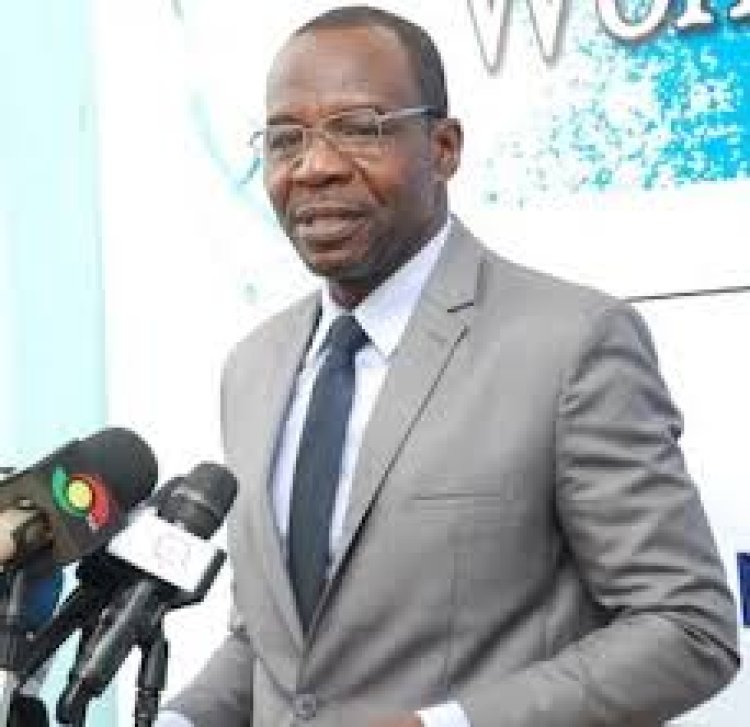President of the Ghana Journalists Association (GJA), Mr. Roland Affail Monney, has now opened up to speak in public about the growing phenomenon of the current physical attacks and arrests meted out to the various practicing journalists in the country.
"Mr. Chairman, Hon Minister of Information, Deputy Minister of Information, UNESCO Resident Representative, EU Ambassador to Ghana, Charge d’ Affaires of US Embassy in Accra, Heads of Media Institutions, Editors, Senior Journalists, Media Partners, Distinguished Ladies, and Gentlemen. It is with a heavy heart that I welcome you all to the 2022 World Press Freedom Day. Heavy heart because of Ghana’s latest ranking on the World Press Freedom Index which is depressing enough to effect dramatic mood swings from one of celebration to that of lamentation,' Mr. Monney was quoted in his speech he reads on the occasion to mark international press freedom in Ghana.
Visibly sad, the JGA President noted that a drop in ranking had been anticipated due to a confluence of anti-media factors.
"But never did we expect the drop to be so precipitous- 3rd in Africa to 10th, and 30th in the world to 60th, a 100 percent decline," he added.
He stressed that "We watched with a shudder and heard with shiver, merciless arrests and reckless attacks and animalistic disregard for the rights of several journalists in the line of duty."
According to him, the deterministic outcome has been a sharp deterioration of the safety of journalists. Death threats rained on investigative journalists also went uninvestigated, let alone punished, while law enforcement officers who were supposed to protect journalists rather brutalized them.
He mentioned that three years on the spin, the assassination of Ahmed Suale of Tiger Eye fame in the most heinous of circumstances has been a stain on Ghana’s reputation as a land of freedom and justice, a citadel of media freedom, and a beacon of democratic accomplishment in Africa.
He pointed out that assurance upon the assurance of arresting the perpetrators has remained hollow rhetoric.
Soon after his appointment last year, he indicated that "we received with hope the announcement by the IGP Dr. George Akuffo Dampare that a special unit had been established by the police to handle all such unresolved cases of brutalities against journalists. That hope is wobbling."
Despite its damning tone, he mentioned that the global press freedom report does not spell perpetual doom and gloom, nor does it sentence Ghana to an irreversible situation.
According to him, it still recognizes Ghana as a regional pillar of democratic stability.
In this regard, he stressed that no institution comes near the media in terms of contributions to the country’s democratic baseline, and the fight against corruption.
"By strengthening their independent streak, solidifying their objective bent, amplifying their critical voice, and deepening their robust foothold, a vertiginous rise again on the global media league table is possible.
"The drive for resurgence also calls for a clear, radical, and resolute stance to deal surgically with the cancerous spread of impunity," he said
He asserted that impunity ignites a self-propelling and re-energizing cycle which becomes hellishly difficult to defeat if it is not tackled from the root.
"And the root approach is applying the law fairly and squarely, to all offenders, at all times, regardless of their partisan stripes, material wealth, or social standing.
"We note with regrets that the Broadcasting Bill designed to address the lingering challenges on the airwaves has been incubating for far too long.
"While we urgently demand the birth of the proposed law, either by natural or Caesarian means, we need to orchestrate a national conversation to take a hard look at the ownership structure of the media," he stated.
He pointed out that ownership confers control on media owners, some of who go to the extent of dictating content to the professionals they employ, adding that "We dare say that this issue poses the greatest threat to media freedom in modern memory.
He stated that a twin threat to press freedom is the pitiable conditions of service of journalists.
According to JGA President, the International Federation of Journalists (IFJ) bluntly puts it that “there can be no press freedom if journalists exist in conditions of corruption, poverty or fear.”
In the face of the cost of living challenges, he noted that the time has come, more than ever before, to address the flip-flop poverty in the media. As the JGA strive to obtain a bargaining certificate after unionization, journalists themselves must treat their survival issues with utmost importance.
He was of the view that Ghana’s decline on the global press freedom index does not obscure the fact that some notable individuals have held high the banner of distinctly distilled journalism.
He pointed out that the majority of media workers, producers, presenters, technicians, and others deliver peak performance as they endure endless working hours, deep-set fatigue, incessant deadlines, and a brusque environment.
"To all such people in Wa, Tumu, Tamale, Bolgatanga, Axim, Elubo, Kumasi, Takoradi, Cape Coast, Accra, Ho, and Afloa, we say Ayeekooo,' he said
He noted that on the flip side are a few whose cynical disdain and breezy disregard for ethical values give media watchers and consumers a huge cause for concern.
He stressed that they must shape up in response to the dictates of their noble profession.
He expressed GJA's profound appreciation to UNESCO and the European Union for sponsoring this year’s celebration of World Press Freedom Day.


 Freeman Koryekpor Awlesu Greater
Freeman Koryekpor Awlesu Greater 



































